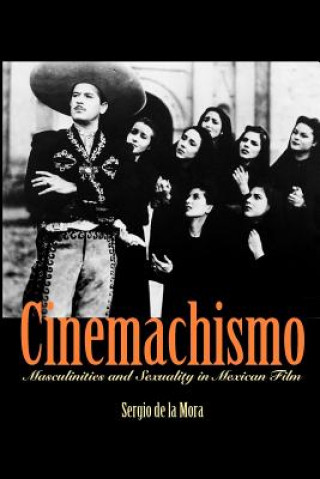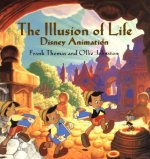
Kód: 04872633
Cinemachismo
Autor Sergio De La Mora
After the modern Mexican state came into being following the Revolution of 1910, hyper-masculine machismo came to be a defining characteristic of 'mexicanidad', or Mexican national identity. Virile men (pelados and charros), virtu ... celý popis
- Jazyk:
 Angličtina
Angličtina - Vazba: Brožovaná
- Počet stran: 256
Nakladatelství: University of Texas Press, 2006
- Více informací o knize

Mohlo by se vám také líbit
-

Iron Filings: The Cartoons of Over Land and Sea
442 Kč -

ABC of Sexually Transmitted Infections 6e
1482 Kč -

First Course in Finite Elements +CD
1913 Kč -

Andrew Crozier Reader
721 Kč -

Repeated Games and Reputations
4224 Kč -

Beyond Nature and Culture
1036 Kč -

Design and Implementation of US Climate Policy
4224 Kč
Darujte tuto knihu ještě dnes
- Objednejte knihu a zvolte Zaslat jako dárek.
- Obratem obdržíte darovací poukaz na knihu, který můžete ihned předat obdarovanému.
- Knihu zašleme na adresu obdarovaného, o nic se nestaráte.
Více informací o knize Cinemachismo
Nákupem získáte 86 bodů
 Anotace knihy
Anotace knihy
After the modern Mexican state came into being following the Revolution of 1910, hyper-masculine machismo came to be a defining characteristic of 'mexicanidad', or Mexican national identity. Virile men (pelados and charros), virtuous prostitutes as mother figures, and minstrel-like gay men were held out as desired and/or abject models not only in governmental rhetoric and propaganda, but also in literature and popular culture, particularly in the cinema. Indeed, cinema provided an especially effective staging ground for the construction of a gendered and sexualized national identity. In this book, Sergio de la Mora offers the first extended analysis of how Mexican cinema has represented masculinities and sexualities and their relationship to national identity from 1950 to 2004. He focuses on three traditional genres (the revolutionary melodrama, the cabaretera [dancehall] prostitution melodrama, and the musical comedy 'buddy movie') and one subgenre (the fichera brothel-cabaret comedy) of classic and contemporary cinema. By concentrating on the changing conventions of these genres, de la Mora reveals how Mexican films have both supported and subverted traditional heterosexual norms of Mexican national identity. In particular, his analyses of Mexican cinematic icons Pedro Infante and Gael Garcia Bernal and of Arturo Ripstein's cult film El lugar sin limites illuminate cinema's role in fostering distinct figurations of masculinity, queer spectatorship, and gay male representations. De la Mora completes this exciting interdisciplinary study with an in-depth look at how the Mexican state brought about structural changes in the film industry between 1989 and 1994 through the work of the Mexican Film Institute (IMCINE), paving the way for a renaissance in the national cinema.
 Parametry knihy
Parametry knihy
Zařazení knihy Knihy v angličtině The arts Film, TV & radio Films, cinema
862 Kč
- Plný název: Cinemachismo
- Podnázev: Masculinities and Sexuality in Mexican Film
- Autor: Sergio De La Mora
- Jazyk:
 Angličtina
Angličtina - Vazba: Brožovaná
- Počet stran: 256
- EAN: 9780292712973
- ISBN: 0292712979
- ID: 04872633
- Nakladatelství: University of Texas Press
- Hmotnost: 463 g
- Rozměry: 229 × 152 × 19 mm
- Datum vydání: 01. June 2006
Oblíbené z jiného soudku
-

Spiderman Into the Spider-Verse
890 Kč -

The Animator's Survival Kit
996 Kč -

Art of How to Train Your Dragon 2
949 Kč -

Art of Godzilla: King of the Monsters
804 Kč -

Art of Disney Postcards
459 Kč -

Art of Horror Movies
797 Kč -

Alien
944 Kč -

Columbo
1869 Kč -

Reel Families
698 Kč -

Art of Fantastic Beasts: The Crimes of Grindelwald
1039 Kč -

Puppet Master Complete
1350 Kč -

Sound Effects Bible
566 Kč -

Star Wars The Complete Visual Dictionary New Edition
979 Kč -

Film Noir Compendium
722 Kč -

The Art and Soul of Dune
1312 Kč -

Alien: The Blueprints
810 Kč -

The Art of Princess Mononoke
758 Kč -

Of Walking In Ice
249 Kč -

Animator's Survival Kit
1078 Kč -

Art of Mad Max: Fury Road
677 Kč -

Science of Dune
580 Kč -

Starting Point: 1979-1996
407 Kč -

Star Trek: Light-Up Starship Enterprise
311 Kč -

Eat What You Watch
441 Kč -

Jurassic Park
1187 Kč -

The Art of Tangled
819 Kč -

Wes Anderson
719 Kč -

Walt Disney
410 Kč -

Story
750 Kč -

Interstellar
545 Kč -

Jonesy
276 Kč -

Making of Alien
1145 Kč -

The Celestine Prophecy
306 Kč -

Sly Moves
528 Kč -

ISE Film Art: An Introduction
1908 Kč -

Star Wars - the Jedi Path
464 Kč -

Mean Girls: The Burn Book Hardcover Ruled Journal
439 Kč -

The Illusion of Life : Disney Animation
1356 Kč -

Ghostbusters: Proton Pack and Wand
276 Kč -

Donnie Darko Book
445 Kč -

The Star Wars Archives 1977–1983
4970 Kč -

Alien: The Archive - The Ultimate Guide to the Classic Movies
944 Kč -

Filmmaker's Handbook, The (fifth Edition)
820 Kč -

Sofia Coppola
478 Kč -

Making of Aliens
1145 Kč -

Lynch on Lynch
446 Kč -

Painting With Light
864 Kč -

Grammar of the Film Language
814 Kč -

Persona 5
924 Kč
Osobní odběr Praha, Brno a 12903 dalších
Copyright ©2008-24 nejlevnejsi-knihy.cz Všechna práva vyhrazenaSoukromíCookies



 Vrácení do měsíce
Vrácení do měsíce 571 999 099 (8-15.30h)
571 999 099 (8-15.30h)